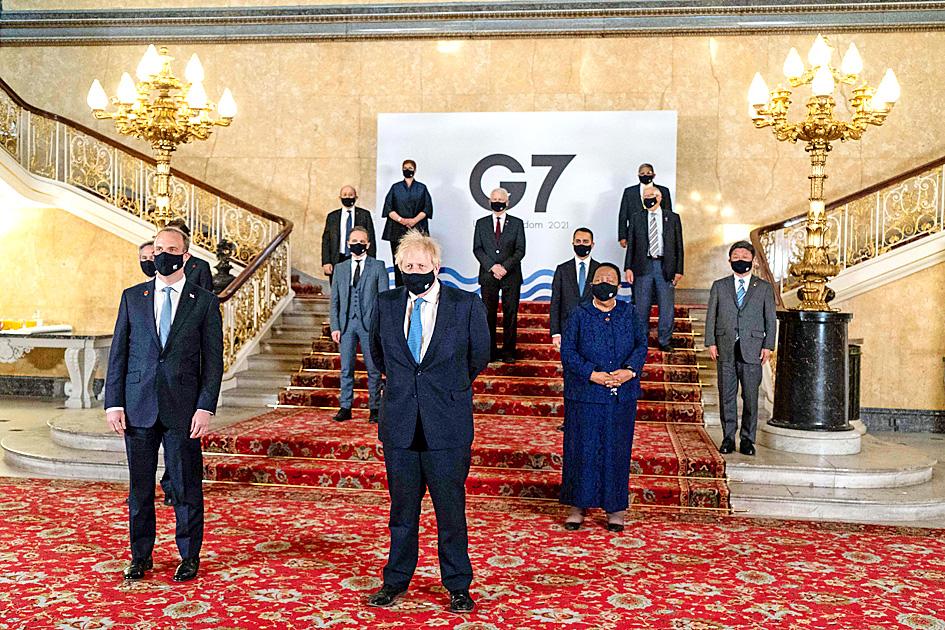The Presidential Office yesterday thanked the G7 foreign ministers for their strong support of Taiwan after the group in its joint statement on Wednesday called for the nation’s participation in the WHO, and the importance of peace and stability across the Taiwan Strait.
The ministers in a communique issued at the end of their three-day meeting declared support for “Taiwan’s meaningful participation” in WHO forums and the World Health Assembly (WHA).
“The international community should be able to benefit from the experience of all partners, including Taiwan’s successful contribution to the tackling of the COVID-19 pandemic,” it said.

Photo: AFP / Niklas Halle’n / European Commission
The statement included a section on the East and South China seas, in which it explicitly referenced the Taiwan Strait.
“We underscore the importance of peace and stability across the Taiwan Strait, and encourage the peaceful resolution of cross-strait issues,” it said.
The group reiterated concern regarding “any unilateral actions” that could escalate tensions and undermine regional stability.
Referencing the UN Convention on the Law of the Sea, it emphasized the importance of an international rules-based order, while calling a July 2016 Permanent Court of Arbitration ruling on the South China Sea a “useful basis” for peacefully resolving disputes.
It was the first time that the G7 foreign ministers mentioned Taiwan in one of their joint communiques, Presidential Office spokesman Xavier Chang (張惇涵) said in a statement.
The 2019 communique, while implying support for Taiwan’s participation in the International Civil Aviation Organization, fell short of mentioning the nation by name.
The statement once again expresses international recognition of Taiwan’s democratic and unified handling of COVID-19, Chang said.
It reiterates that stability in the Taiwan Strait is no longer merely a cross-strait issue, but involves the entire Indo-Pacific region and has become a focus of global attention, he added.
Whether by helping to maintain regional stability or contributing to global health, Taiwan is showing that it can help, and is helping, Chang added.
The Ministry of Foreign Affairs also welcomed the statement, while vowing to deepen cooperation on global health and security with the G7 nations.
The joint declaration is especially significant, given that the WHA is set to convene in a little more than two weeks on May 24, it said in a news release.
It was also the second time in the past few months that G7 members have referred to the “importance of peace and stability in the Taiwan Strait,” following a similar US-Japan joint statement issued on April 16, the ministry added.
In attendance at the foreign ministers’ meeting were representatives of the G7 nations — Canada, France, Germany, Italy, Japan, the UK and the US — as well as Australia, the EU, India, South Africa, South Korea and ASEAN.

Right-wing political scientist Laura Fernandez on Sunday won Costa Rica’s presidential election by a landslide, after promising to crack down on rising violence linked to the cocaine trade. Fernandez’s nearest rival, economist Alvaro Ramos, conceded defeat as results showed the ruling party far exceeding the threshold of 40 percent needed to avoid a runoff. With 94 percent of polling stations counted, the political heir of outgoing Costa Rican President Rodrigo Chaves had captured 48.3 percent of the vote compared with Ramos’ 33.4 percent, the Supreme Electoral Tribunal said. As soon as the first results were announced, members of Fernandez’s Sovereign People’s Party

EMERGING FIELDS: The Chinese president said that the two countries would explore cooperation in green technology, the digital economy and artificial intelligence Chinese President Xi Jinping (習近平) yesterday called for an “equal and orderly multipolar world” in the face of “unilateral bullying,” in an apparent jab at the US. Xi was speaking during talks in Beijing with Uruguayan President Yamandu Orsi, the first South American leader to visit China since US special forces captured then-Venezuelan president Nicolas Maduro last month — an operation that Beijing condemned as a violation of sovereignty. Orsi follows a slew of leaders to have visited China seeking to boost ties with the world’s second-largest economy to hedge against US President Donald Trump’s increasingly unpredictable administration. “The international situation is fraught

MORE RESPONSIBILITY: Draftees would be expected to fight alongside professional soldiers, likely requiring the transformation of some training brigades into combat units The armed forces are to start incorporating new conscripts into combined arms brigades this year to enhance combat readiness, the Executive Yuan’s latest policy report said. The new policy would affect Taiwanese men entering the military for their compulsory service, which was extended to one year under reforms by then-president Tsai Ing-wen (蔡英文) in 2022. The conscripts would be trained to operate machine guns, uncrewed aerial vehicles, anti-tank guided missile launchers and Stinger air defense systems, the report said, adding that the basic training would be lengthened to eight weeks. After basic training, conscripts would be sorted into infantry battalions that would take

GROWING AMBITIONS: The scale and tempo of the operations show that the Strait has become the core theater for China to expand its security interests, the report said Chinese military aircraft incursions around Taiwan have surged nearly 15-fold over the past five years, according to a report released yesterday by the Democratic Progressive Party’s (DPP) Department of China Affairs. Sorties in the Taiwan Strait were previously irregular, totaling 380 in 2020, but have since evolved into routine operations, the report showed. “This demonstrates that the Taiwan Strait has become both the starting point and testing ground for Beijing’s expansionist ambitions,” it said. Driven by military expansionism, China is systematically pursuing actions aimed at altering the regional “status quo,” the department said, adding that Taiwan represents the most critical link in China’s